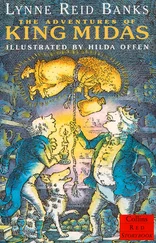Glyn Iliffe - King of Ithaca (Adventures of Odysseus)
Здесь есть возможность читать онлайн «Glyn Iliffe - King of Ithaca (Adventures of Odysseus)» весь текст электронной книги совершенно бесплатно (целиком полную версию без сокращений). В некоторых случаях можно слушать аудио, скачать через торрент в формате fb2 и присутствует краткое содержание. Год выпуска: 2009, ISBN: 2009, Издательство: Macmillan Publishers UK, Жанр: Старинная литература, на английском языке. Описание произведения, (предисловие) а так же отзывы посетителей доступны на портале библиотеки ЛибКат.
- Название:King of Ithaca (Adventures of Odysseus)
- Автор:
- Издательство:Macmillan Publishers UK
- Жанр:
- Год:2009
- ISBN:9780230744486
- Рейтинг книги:3 / 5. Голосов: 1
-
Избранное:Добавить в избранное
- Отзывы:
-
Ваша оценка:
- 60
- 1
- 2
- 3
- 4
- 5
King of Ithaca (Adventures of Odysseus): краткое содержание, описание и аннотация
Предлагаем к чтению аннотацию, описание, краткое содержание или предисловие (зависит от того, что написал сам автор книги «King of Ithaca (Adventures of Odysseus)»). Если вы не нашли необходимую информацию о книге — напишите в комментариях, мы постараемся отыскать её.
King of Ithaca (Adventures of Odysseus) — читать онлайн бесплатно полную книгу (весь текст) целиком
Ниже представлен текст книги, разбитый по страницам. Система сохранения места последней прочитанной страницы, позволяет с удобством читать онлайн бесплатно книгу «King of Ithaca (Adventures of Odysseus)», без необходимости каждый раз заново искать на чём Вы остановились. Поставьте закладку, и сможете в любой момент перейти на страницу, на которой закончили чтение.
Интервал:
Закладка:
‘Your incantations don’t work, so save your breath and let me speak. King Menestheus of Athens has sent me to consult the oracle. And in return for an answer to his question he promises three bronze tripods and cauldrons to match, as well as twenty talents of silver.’
The wailing stopped and the priest came down a few cautious steps. ‘What’s the question?’
‘A great sea monster – a kraken – has been smashing our ships into kindling and devouring the crews and cargoes whole. Our merchants are afraid to leave port and we Athenians are starting to feel the pinch. The king’s desperate for the wisdom of Gaea to help rid his city of the beast, and so I must speak to the Pythoness. Every wasted day puts more of our ships in peril and starves Athens of much-needed trade.’
As Eperitus listened to Castor’s story he began to wonder further about his friend’s identity. Did he really come from Crete – as he had told him – or was he in truth an envoy from King Menestheus? Surely he could not cheat his way into an audience with the Pythoness on the pretence of being an Athenian, then ask about a voyage from Crete? He glanced at Halitherses and Antiphus, but they avoided his eyes.
‘There were Athenian merchants here only the day before yesterday,’ the priest responded suspiciously. ‘Why didn’t they mention this kraken?’
‘Because they buy goods from the ships of other cities,’ Castor replied. ‘If they came here and put it about that a sea monster was attacking vessels just off the harbour at Piraeus, the rumour would spread and no foreign merchant would dare come to Athens – they’d be out of business within weeks. Didn’t they appear a little nervous?’
At that moment, a husky female voice called out faintly from deep within the temple. ‘Lies within lies!’ it echoed. ‘Don’t let him in! A maze he is, that man, unto others and unto himself. Though not to us. Not to me.’
The voice laughed, a horrible, retching chuckle.
‘Through the fumes we see him clearly,’ it continued. ‘We know him, then, now and tomorrow. Send him away, quickly. Sleep matters more than poor island princes.’
The priest looked angrily at Castor, who stared back even more determined than ever.
‘I’m not some dog who’ll sleep by the footstool of its master, waiting to be woken with a kick,’ he said, gripping the hilt of his sword. ‘In the name of Athena, you will let me in!’
‘Indeed,’ said a voice from behind the warriors. They turned to see another priest, an older man this time with white robes, a purple cloak draped over one arm and carrying a staff the length of a spear. There was something ethereal about him; his long hair and beard appeared to be filled with strands of bright silver and he had big, round eyes like an owl and a nose that ran straight and did not dip at the bridge.
‘Let them in, let them in,’ the old man said authoritatively, striding towards the pilgrims and waving them up the steps.
‘But Elatos,’ the other priest protested, ‘the Pythoness said to send them away.’
‘We may be priests, Thrasios, but it sometimes makes us arrogant and heedless of our duties as human beings.’ The head priest reached the entrance to the temple and Eperitus suddenly noticed how tall he was – a full head and shoulders above everybody else, even Halitherses. He placed a hand on the younger priest’s arm. ‘Now then, you can see these men are nobles; warriors, no less. Take their animals and sacrifice them, as is required, and call on the presence of the gods this sombre night. Unless I’m greatly mistaken, the prince here will not be kept waiting.’
‘That’s right, my lord. I’m Castor, son of Hylax, come from the island of Crete to consult the oracle.’
‘Are you and have you?’ said the priest sceptically. He placed his fists on his hips and spat irreverently on the step. ‘My name is Elatos, and if you wish to speak with the Pythoness you will first give me three copper pieces. As you’ve brought two animals I assume one of your friends also wishes to receive her wisdom? That will be another three copper pieces.’
Eperitus pulled three of the dwindling number of coins from his pouch and handed them cautiously to the man. ‘I seek the will of the gods.’
‘A wise thing to do,’ the head priest replied, taking his payment along with Castor’s and hiding the pieces in a fold of his robe. ‘Once the sacrifice has been made, follow Thrasios through the crack in the rock at the back of the temple. He will lead you to the Pythoness, but stay close to him! A serpent – Gaea’s own son – protects the priestess, and he’s been known to pick off the odd stray pilgrim.
‘Thrasios will also interpret the Pythoness’s ramblings for you. I find his devotion to the gods helps him understand the precise meaning of the priestess’s gibberish. She’s quite unconscious of it herself, of course. Spouts the stuff all day long yet can’t remember a word of it, let alone interpret it.’
At that point Thrasios appeared on the broad top step. He held Castor’s goat under one arm and a sacrificial knife in his free hand.
‘Come through,’ he ordered, impatiently.
Antiphus led the way. Only Elatos remained, wishing the men goodbye before turning to retreat down the steps. As he placed his foot on the first step, though, he caught Castor’s eye and said in a hushed voice, ‘Meet me by the sacred pool when this is over. I have something to discuss with you.’ Eperitus was not given time to ponder Elatos’s words, as Castor pushed him in through the high, pillared doorway.
Viewed from the outside the temple looked small, but inside it had been delved into the rock-face and was as big as the great hall of the king’s palace in Alybas. The ceiling was high and dark, punctured by a hole through which the blue evening sky was visible. A large, well-stocked fire in the centre of the temple sent trails of smoke through the room, most of which eventually escaped out of the vent in the roof. In the side walls were alcoves that housed rough terracotta images of various gods, each of them lit by a flaming torch that left great black scars on the limestone plaster above. The plaster itself was decorated with what had once been colourful images of animals and men moving through a landscape of rivers and trees, but now these pictures were fading and in places had peeled away. The smoke of the fire and the torches had dulled some beyond recognition.
Only the far wall remained untouched. This was the sheer face of the mountain: rugged, grey and cold. Eating a line straight through its centre was a dark crack, just wide enough for two men to enter side by side. Eperitus strained his eyes to see into its blackness, but the firelight that filled the temple revealed nothing of whatever lay beyond. Then, as he watched, he heard a faint hissing that made his flesh creep. Suddenly he was reminded of what Elatos had said about the serpent that guarded the oracle. His hand instinctively sought the hilt of his sword and with a shudder he turned away.
To his left Thrasios was kneeling and holding the two goats by their stumpy horns. A second priest appeared from a side door and placed shallow bowls of water on the floor. A moment later the animals bowed their heads to drink, unconsciously giving their consent to be sacrificed. Hardly allowing the black animal to take a second lap of the water, Thrasios lifted it to the altar and, picking up his knife, cut off a wisp of its wiry hair. This he threw into the blazing fire whilst uttering prayers to Gaea, conducting the ritual with practised ease and with the relish of a man who enjoyed his work. Eperitus watched in admiration as he controlled the struggling beast with one hand then stunned it with a blow from the handle of his knife. A moment later, still calling on the goddess, he placed a large bowl beneath the goat’s limp head and slit its throat. Thrasios waited for the gush of blood to stop then handed the carcass to the other priest, who finished the work of cutting it up. The second animal met the same efficient death and its various parts were shared between the fire, as a burnt offering to the gods, and the priests, for their evening meal.
Читать дальшеИнтервал:
Закладка:
Похожие книги на «King of Ithaca (Adventures of Odysseus)»
Представляем Вашему вниманию похожие книги на «King of Ithaca (Adventures of Odysseus)» списком для выбора. Мы отобрали схожую по названию и смыслу литературу в надежде предоставить читателям больше вариантов отыскать новые, интересные, ещё непрочитанные произведения.
Обсуждение, отзывы о книге «King of Ithaca (Adventures of Odysseus)» и просто собственные мнения читателей. Оставьте ваши комментарии, напишите, что Вы думаете о произведении, его смысле или главных героях. Укажите что конкретно понравилось, а что нет, и почему Вы так считаете.










